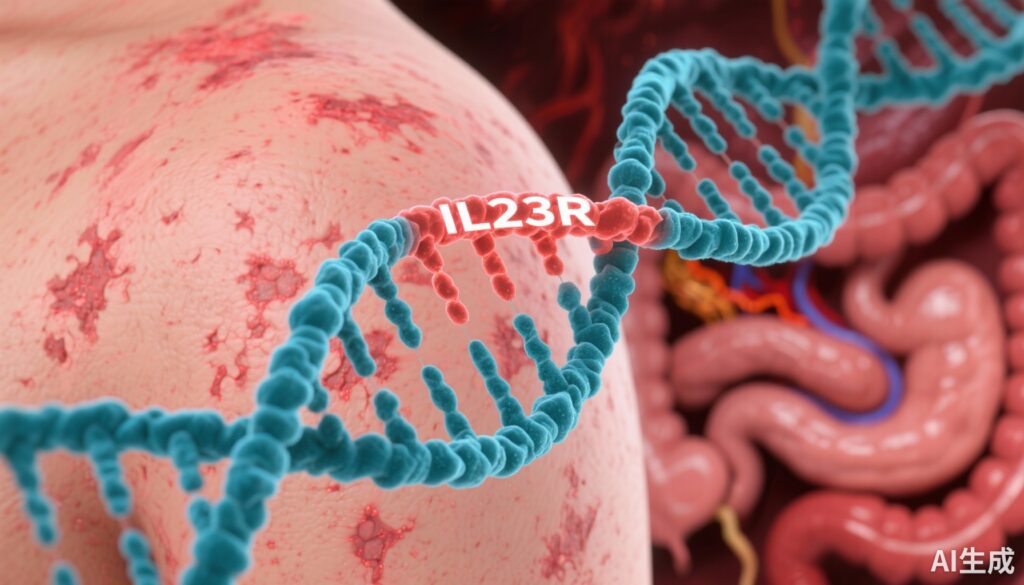Highlight
– IL23R1142G>A single nucleotide polymorphism is strongly associated with paradoxical psoriasis (PP) development in IBD patients treated with anti-TNFα agents.
– PP incidence among anti-TNFα-exposed IBD patients is approximately 5.1%, often severe, prompting treatment withdrawal.
– No other clinical variables demonstrated predictive value for PP, emphasizing the genetic marker’s potential clinical utility.
– Genotyping IL23R may enable risk stratification and personalized therapy to optimize management and minimize adverse effects in IBD care.
Study Background
Inflammatory bowel disease (IBD), comprising Crohn’s disease and ulcerative colitis, often requires immunomodulatory therapies to control chronic intestinal inflammation. Tumour necrosis factor-alpha (TNFα) inhibitors are cornerstone biologics that have transformed disease management. However, paradoxical psoriasis (PP) is an increasingly recognized adverse reaction to anti-TNFα treatment, characterized by new-onset or exacerbation of psoriatic skin lesions despite TNFα blockade. These lesions can be disfiguring and impair quality of life, complicating IBD treatment regimens.
Currently, there is an unmet clinical need for predictive tools to identify individuals at risk of PP before initiating anti-TNFα therapy. The interleukin-23 receptor (IL23R) gene has been implicated in psoriasis pathogenesis. Variants of IL23R are known to influence susceptibility to psoriasis and IBD independently, but their role in anti-TNFα-induced PP remains underexplored.
Study Design
This retrospective cohort study evaluated adult patients with IBD exposed to anti-TNFα agents. Participants were genotyped for the IL23R1142G>A single nucleotide polymorphism (SNP). Medical records were reviewed to identify cases of PP following anti-TNFα exposure and assess clinical variables potentially associated with PP development.
The primary endpoint was the occurrence of PP in relation to IL23R1142G>A genotype status. Secondary analyses addressed clinical characteristics predictive of PP and the impact of PP on IBD treatment continuation or cessation.
Key Findings
The study included 499 IBD patients with a total of 570 unique anti-TNFα therapy exposures. Among these exposures, 29 cases (5.1%) of PP were identified. The majority of PP cases (69%) were clinically severe, frequently necessitating cessation of anti-TNFα treatment, which led to full resolution of the psoriatic lesions in affected individuals.
Genotyping revealed a striking association between IL23R1142G>A variant presence and PP development. Specifically, 46.2% of patients who developed PP carried the variant genotype compared with only 5.1% of patients without PP. This corresponded to an odds ratio of 17.8 (95% confidence interval 7.8–40.0; p < 0.0001), demonstrating a highly significant predictive relationship.
No other analyzed clinical variables—including demographics, IBD subtype, duration of anti-TNFα therapy, or concomitant medications—showed statistically significant associations with PP occurrence.
Expert Commentary
The identification of the IL23R1142G>A polymorphism as a strong genetic predictor for paradoxical psoriasis in this high-risk setting adds valuable insight into the immunogenetic underpinnings of adverse reactions to biologic therapies. Mechanistically, IL-23 signaling drives Th17 cell differentiation and maintenance, implicated in psoriasis pathophysiology, and its dysregulation in the context of TNFα blockade may trigger paradoxical cutaneous inflammation.
Integrating IL23R genotyping into clinical workflows could facilitate personalized medicine approaches by identifying patients at elevated risk for PP and guiding therapeutic choices accordingly. Clinicians may opt for alternative biologics or monitor for early dermatologic signs in genetically susceptible individuals, thereby mitigating treatment disruptions.
Nevertheless, the results warrant prospective validation in diverse populations to assess generalizability and to further explore gene-environment interactions influencing PP. Additionally, cost-effectiveness analyses are needed before widespread implementation of IL23R polymorphism testing.
Conclusion
Variation in the IL23R gene, specifically the IL23R1142G>A SNP, is a powerful predictor of paradoxical psoriasis induced by anti-TNFα therapy in patients with IBD. This genetic marker outperforms clinical risk factors and holds promise as a clinically actionable biomarker for tailoring IBD treatment.
Future research should aim to validate these findings across larger and ethnically diverse cohorts and integrate IL23R genotyping into precision medicine frameworks to optimize therapeutic safety and efficacy. This study highlights the evolving role of pharmacogenetics in managing complex immune-mediated diseases.
Reference
Natt N, Gindi M, Dela Cruz GR, Ponich T, Gregor JC, Chande N, Beaton MD, McIntosh K, Sey M, Khanna R, Kim RB, Wilson A. IL23 Receptor Polymorphism Is a Predictor of Anti-Tumour Necrosis Factor-α-Induced Paradoxical Psoriasis in Inflammatory Bowel Disease. Aliment Pharmacol Ther. 2025 Sep 16. doi: 10.1111/apt.70377. Epub ahead of print. PMID: 40958496.


